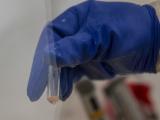Apr 8, 2008 (CIDRAP News) – Iomai Corp., a biotechnology company that specializes in needle-free vaccines, announced today that it will receive a grant from the US Department of Defense (DoD) to fund preclinical development of a patch-based anthrax vaccine.
The 1-year grant to Iomai, based in Gaithersburg, Md., will be in the form of a $943,856 cost reimbursement from the US Army Medical Research and Material Command, according to a press release from Iomai.
Work on the vaccine will combine an antigen developed by Avecia Biologics, Ltd., based in the United Kingdom, with an Iomai adjuvant on a skin patch. Iomai said its next step would be to gauge the stability of the patch to see if it can be stored and shipped at room temperature.
The current licensed anthrax vaccine, made by Emergent BioSolutions Inc., must be refrigerated and is given as a six-shot regimen over 18 months. The US government has been seeking a second-generation product to replace anthrax vaccine adsorbed (AVA), developed in the 1950s, with hopes that a newer product would require fewer doses and produce minimal side effects. Some military personnel have objected to AVA because of reported serious side effects.
"The military has a clear need for an effective anthrax vaccine that can be stockpiled and shipped at room temperature, and we believe that Iomai has the scientific know-how and the manufacturing ability to meet that need," said Stanley C. Erck, Iomai's president and chief executive officer, in the press release.
Iomai says it has developed techniques for drying proteins, such as the anthrax vaccine, to allow administration with a patch the size of an adhesive bandage. The company says it has four other products using the protein-drying technology in its development pipeline; three are aimed at seasonal and pandemic influenza and the other at travelers' diarrhea.
On Apr 2, PharmAthene, an Annapolis, Md., biodefense company, announced that it had finalized its acquisition of the biodefense vaccine business of Avecia, Iomai's anthrax vaccine partner. Iomai acknowledged the sale in its press release but did not give any details about how it would affect preclinical work on the anthrax vaccine patch.
PharmAthene, in its press release, said it had acquired all of the assets related to Avecia's vaccines business, including intellectual property rights to its recombinant protective antigen (rPA) anthrax vaccine and plague vaccine, as well as government contracts relating to the vaccines that total $60 million.
Avecia has completed phase 2 clinical studies of its rPA anthrax vaccine, according to PharmAthene. In February, the US Department of Health and Human Services (HHS) issued a request for proposals for an anthrax rPA vaccine for the Strategic National Stockpile (SNS), the company said in its press release. The HHS proposal request calls for a company to produce 25 million doses of anthrax vaccine.
On Mar 24, the Wall Street Journal reported that the government's anthrax vaccine contract could be worth more than $400 million.
David P. Wright, PharmAthene's president and chief executive officer, said in the press release that preclinical and clinical studies of Avecia's anthrax vaccine show an antibody response and that it is safe and well tolerated.
"If these results are confirmed in future studies, we believe this vaccine could prove to be a superior choice for procurement in the Strategic National Stockpile for civilian defense against anthrax threats," he said.
Federal officials have hit roadblocks in their efforts to add a second-generation anthrax vaccine to the national stockpile. In December 2006, HHS canceled an $877 million contract with VaxGen, a small biotechnology company based in Brisbane, Calif., after the company had problems with its vaccine's stability and missed a deadline for starting a clinical trial.
In October 2007, a report from the Government Accountability Office (GAO) criticized federal anthrax vaccine procurement efforts, saying officials awarded the contract prematurely, had unrealistic expectations of VaxGen, and were confused about how the vaccine would be used.
See also:
Apr 8 Iomai press release
Apr 2 PharmAthene press release
Oct 31, 2007, CIDRAP News story "GAO critiques anthrax vaccine procurement, management"



















